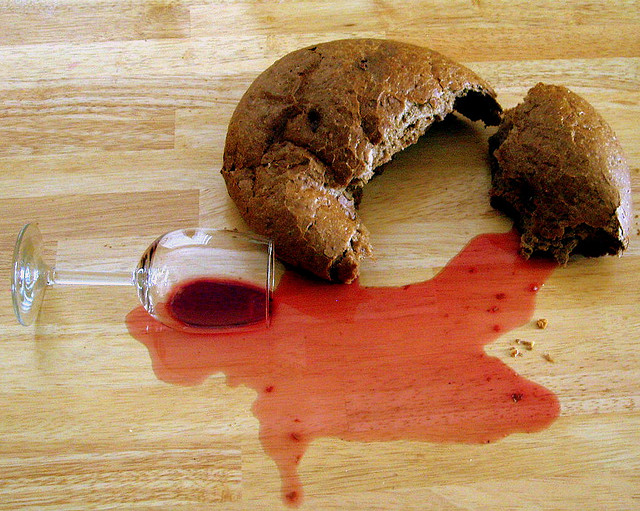Today’s reading: John 5-6.
“Jesus said I had to eat his flesh and drink his blood. Was he being literal?”
Fresh off the miracle of feeding the five thousand, Jesus runs from a crowd of followers who want to make him king. They pursue him around the Sea of Galilee in search, Jesus says, of their next meal. They are looking for a Messiah who will fulfill their idea of a miracle worker granting their wishes for sensual pleasures. Jesus challenges them to believe in him for who he is, the one from heaven, sent by God to give them eternal life. They turn him down and instead challenge him to produce another miracle. They have no faith in him. They think he is only a man, and they will only follow him if he can reproduce Moses’ miracle of bringing down bread from heaven. Jesus declares that he is the bread of life, the first of seven “I am” statements in the book of John.
“I am the bread of life. Your forefathers ate the manna in the desert, yet they died. But here is the bread that comes down from heaven, which a man may eat and not die. I am the living bread that came down from heaven. If anyone eats of this bread, he will live forever. This bread is my flesh, which I will give for the life of the world.” Then the Jews began to argue sharply among themselves, “How can this man give us his flesh to eat?” Jesus said to them, “I tell you the truth, unless you eat the flesh of the Son of Man and drink his blood, you have no life in you. Whoever eats my flesh and drinks my blood has eternal life, and I will raise him up at the last day.” John 6:48-54
It is a hard saying, hard to swallow, and Jesus means it to be hard. There is truth in it, in the center of it, but like a day-old french baguette there is a very tough crust around it. Only the really hungry will make the effort to eat this meal, and that is just what Jesus wants. Most of the crowd find the bread too tough and turn away. How can Jesus expect them to eat him? How can he expect them to believe he is God?
Now you need to ask yourself what Jesus means by requiring this hard-to-swallow meal. Is he literally saying that each one must eat his flesh and drink his blood to gain eternal life? This opinion underlies the Catholic view that the sacrament of communion conveys God’s grace and provides salvation. In this interpretation, Christ’s followers literally eat and drink Christ at communion by eating bread and drinking wine that are miraculously transformed into his body and blood.
Or is Jesus speaking in a parable, hiding a heavenly secret in an earthly picture, meaning to winnow the crowd of pleasure seekers down to the faithful few? Jesus hints at this when he says, “the Spirit gives life; the flesh counts for nothing. The words I have spoken to you are spirit and they are life.” The divide separating Jesus and the crowd was faith. The work to which he called them was the task of believing. Specifically, he called them to believe that laying down his life would save their lives, that his broken and spilled out body and blood would make them whole. The meat of the meal was faith in Jesus. This fits most with the “whole counsel of God.” Salvation comes by faith in Jesus rather than by the practice of a sacrament. The sacraments are memorials that remind us of spiritual truths. As Jesus said, “do this to remember me.”
As a man in eating takes the morsels to himself and says, “This is bread which I believe nourishes the body, and it shall now nourish me, I take it to be my bread,” so must we do with Christ. Dear Brothers and Sisters, we must say, “Jesus Christ is set forth as a Propitiation for sin, I accept Him as the Propitiation for my sin. God gives Him to be the foundation upon which sinners’ hopes are to be built; I take Him to be the Foundation of my hopes. He has opened a fountain for sin and for uncleanness; I come to Him and desire to wash away my sin and my uncleanness in the fountain of His blood.” – Charles Spurgeon
Image by Dave King on Flickr, CC by-nc-sa 2.0

Reblogged this on ChristianBlessings and commented:
Jesus Christ the propitiation for our sins and soon coming King. Amen.